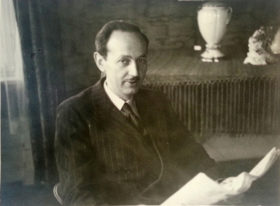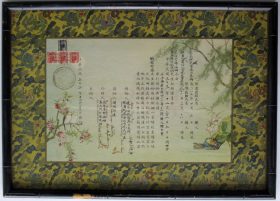Max Karp on his deportation from Berlin on October 28, 1938
“On 28.10 at 6 o’clock in Berlin we were taken from our beds and detained by the police. People from the neighborhoods of Mitte, northern Berlin and Tiergarten were gathered at the barracks on Kleine Alexanderstr.”

Mendel Max Karp, Berlin around 1935; Jewish Museum Berlin, gift of Joanne Intrator
Thus begins Mendel Max Karp’s lengthy account about his deportation from the German capital exactly 80 years ago. He composed it on November 17, 1938 in the Polish border town of Zbąszyń, in a letter to his nephew Gerhard Intrator, who had been living in New York since 1937. Max Karp was a musician born in the village of Ruszelczyce near Przemyśl in 1892. His letter harrowingly depicts the precise process of his detention and deportation. Max Karp was one of the roughly 17,000 Polish nationals who were expelled from Germany during the Polenaktion (“Polish Action”) of October 27–29, 1938. His depiction of the events is among the very earliest and is unparalleled in its level of detail and scope. The account of his experiences on October 28th and 29th is provided here in its entirety: → continue reading
– How Jewish Memory Objects Preserve Chinese History

Chinese marriage certificate for Irma Bielschowsky (1902–2000) and Albert Elias Less (1887–1952), 1944; Jewish Museum Berlin, gift of Gert and Brigitte Stroetzel
I recently shared my view on several objects from Shanghai in the museum’s collection on this blog. Now, I want to draw your attention to a few marriage certificates that caught my eye not just because of their elegant design and well-preserved condition after more than 70 years, but also because I was amazed how Chinese cultural elements had entered and influenced the life of Jews who fled the Nazi rule, even though the Jews largely maintained their own cultural and educational activities in Shanghai with newspapers, Jewish schools, concerts, sport activities, theaters (e.g. Delila, Nathan der Weise, etc.), and parties (e.g. a not so sober celebration of Purim). → continue reading
From 3 to 7 July 2017, young people from various European countries will assist in excavation work at the memorial premises and search for artifacts there. “Members of the international summer camp group can engage in international exchange during hands-on activities at the memorial,” explains Christine Bischatka, coordinator of the Action Reconciliation Service for Peace international summer camp. → continue reading

